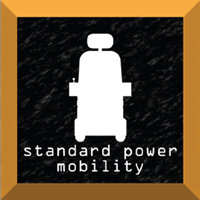The Big 10
Standard Power Mobility Rental
- By David Kopf
- Jan 01, 2012
 The past year has been considerably difficult for providers of standard power mobility devices. It is as though CMS has been on a singular campaign to make running an PMD provider business an impossible proposition.
The past year has been considerably difficult for providers of standard power mobility devices. It is as though CMS has been on a singular campaign to make running an PMD provider business an impossible proposition.
To begin with, 2011 started off with the removal of the first-month purchase option. This represented no less than turning mobility providers’ businesses completely upside down.
Originally, a patient with a permanent mobility condition could purchase a power mobility device at the outset of their claim. This made sense. Why would a patient with a mobility issue lasting longer than 13 months, and perhaps lasting their whole life, need to rent a power chair? But CMS decided that power chairs were a hot bed of fraud and decided that all standard power mobility devices must be rented to patients over a 13-month rental period. Providers would then have to bill Medicare in monthly installments over that time.
Where providers once saw the funding for those PMDs come in one installment, thus covering their initial investment for the expensive equipment, now they had to transition to a rental model. Now providers would have to provide the chair and related services up-front and make it back over time. This meant the complete overhaul of their businesses’ financial structures. Now they must seek inventory financing and other forms of credit to cover the cost of the equipment while waiting for the funding to trickle in over 13 months. Fortunately, manufacturers and other sources of credit have been able to work with them.
But that is only part of the rental equation. This has meant that providers have had to narrow the types of standard PMDs they will provision to patients. Power mobility products must be cost effective, reliable and stand up to the punishment of rental. So providers have had to source equipment that ensures they won’t have to repair them frequently, and that can be easily cleaned up and readied for the next patient. This also means that providers have had to devise inventory management procedures for their rental businesses to ensure previously rented equipment is checked and prepared for the next patient.
Also, mobility providers have had to become efficiency experts just like oxygen providers had to when they transitioned to the 36-month rental cap on oxygen. PMD providers have had to remove all unnecessary costs and inefficiencies out of their business so that they can maximize their margins and retain capital while waiting for funding to come back to them. And, of course, PMD providers billing and accounting procedures have had to be overhauled to support the rental business.
But if removal of the first month purchase option wasn’t bad enough, there are other funding threats facing standard power mobility providers. For starters, there is Round Two of competitive bidding, which covers mobility, but there’s a more immediate thread: the possibility of pre-payment review for all power mobility claims.
On Jan. 2 of this year CMS was slated to launch a demonstration program that would require prepayment review for all Medicare claims for power wheelchairs in California, Florida, Illinois, Michigan, New York, North Carolina and Texas. According to the American Association for Homecare, this will affect nearly half of all Medicare’s power mobility beneficiaries. The industry has been fighting to stop the launch of the demonstration project, noting that CMS has created the program without input from Congress.
Needless to say, providers are still undergoing an incredibly steep learning when it comes to the removal of the first month purchase option, and having to also contend with pre-payment review for all their standard power mobility claims would be a massive setback indeed. This year will be a tough one for power mobility providers, but what they do in 2012 could help them reinvent themselves as highly efficient businesses with rock-solid claims and documentation processes.
This article originally appeared in the January 2012 issue of HME Business.
About the Author
David Kopf is the Publisher HME Business, DME Pharmacy and Mobility Management magazines. He was Executive Editor of HME Business and DME Pharmacy from 2008 to 2023. Follow him on LinkedIn at linkedin.com/in/dkopf/ and on Twitter at @postacutenews.